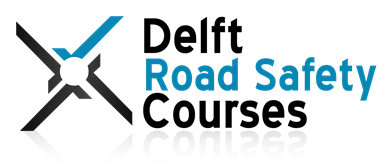Powered Two-Wheelers Online Road Safety Course 2025
Online course
About the Course
The use of powered two- and three-wheelers (P2W) as a family vehicle, recreational, public transportation, for commuting, and business, has been growing in the past two decades, being the main mode of transport in many low- and middle-income countries. This rapid growth without adequate planning has brought many injuries and fatalities.
Motorcyclists are among the most vulnerable road users, with significantly higher fatality rates than those in four-wheeled vehicles across low and middle income countries. To mitigate these risks, a comprehensive approach is necessary: addressing factors such as rider education, infrastructure design, vehicle safety, and law enforcement.
However, to date interventions have focused on how to mitigate injury to users (e.g. use of helmets), and how to mitigate crash risk. There remains a lack of knowledge on the way to address P2W safety as part of the Safe System Approach.
The main objective of this course is to present a comprehensive view of the reality of P2Ws in low and middle income countries, and explain how to address P2W safety using the principles of the Safe System Approach.
The maximum number of participants for this course is limited to 25.
Course details
Applications for this course are now closed.
- 16 October - 11 December 2025
- Five sessions
- Online
- TBD
- 50 plus €2 transaction fee
What will you learn?
After completing this series participants will be able to:
- Analyze trends in motorcycle mortality and crashes in developing countries.
- Implement strategies to reduce motorcycle crashes based on successful road safety models.
- Evaluate the effectiveness of different infrastructure for PTW.
- Raise awareness of the importance of certified helmets and other safety gear.
- Develop awareness and training programs for motorcyclists, focusing on reducing risky behavior.
- Propose regulatory measures and enforcement strategies to ensure compliance with traffic laws.
- Propose road safety measures for P2W in organizations.
Structure
This is an online course of five sessions. Each session will start with a state-of-the-art presentation on the topic, followed by case studies, mainly from LMICs (low and middle income countries), that help us understand the topic through real-life projects.
We envisage a relatively small classroom (max. 25 participants) in order to encourage active participation from participants in the sessions and to prepare homework.
The working language of the course will be English.
Participants will receive a Certificate of Participation in accordance with our Certification Policy.
Session 1
16 October
PTW and road safety
Session 2
30 October
Vehicle safety and Personal Protection Equipment
Session 3
13 November
Infrastructure for PTW
Session 4
27 November
Training and licensing process, enforcement & campaigns
Session 5
11 December
Sustainable practices, work-related issues, and procurement

Who is the course for?
- Professionals working for governments, private sector, universities, NGOs or international organizations.
- Professionals dealing with the design and implementation of road safety strategies.
- Individuals responsible for road safety in public and private organizations.
- Decision and policy makers, researchers or advisors.
- Anyone interested in road safety.
Lecturers and Trainers
Course leadership
Lecturers

Nadine Niwemfura
Healthy People Rwanda

Dr Terry Smith
Galeatus Pavia

Caroline Barber
Transaid

Mohd Khairul Alhapiz Ibrahim
Malaysian Institute of Road Safety Research

Sam Clark
Transaid

Greg Smith
iRAP

Segundo López
Bogotá Mobility Secretariat

Dr. Fangfang Luo
Safety and Mobility Unit, WHO HQ

Pedro Scarpinelli
National Road Safety Agency, Argentina
Approach
Evidence based
We use methodologies and materials that are evidence-based and scientifically sound – supporting a holistic approach to data collection, problem analysis, research and innovation, monitoring and evaluation.
Leading experts
Our courses are delivered by world leading researchers and professionals with experience of working in and with low and middle income countries to improve road safety and sustainable mobility.
Peer learning
Our learning environment encourages students to exchange knowledge and share experiences. This helps in identifying creative, locally relevant solutions to common challenges and issues.
Tailored for LMICs
We base our learning on the Safe System Approach and how this can be tailored and adapted to local contexts, with a focus on the specific challenges faced by low and middle income countries.
Train the trainer
We support local development and the governance of road safety management by developing capacity amongst practitioners and professionals who will return home and share their learning with others.


